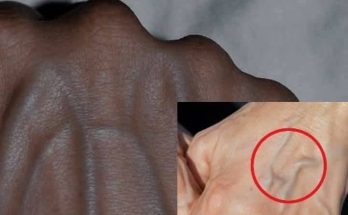In the bloodsport of late-night television, there are jokes, and then there are scalpels. For years, Jimmy Kimmel has wielded his wit against the formidable persona of Donald Trump, treating his political absurdities as a near-infinite source of material. But in a recent monologue, Kimmel put down the broadsword he uses for politics and picked up a finely sharpened dagger, aiming it not at Trump the politician, but at Trump the husband. The result was a comedy bomb that detonated deep inside the walls of Mar-a-Lago, triggering a public meltdown that was as revealing as it was ridiculous, and proving once again that the former president’s most profound vulnerability isn’t political—it’s personal.
Kimmel’s attack was a masterclass in targeted comedic humiliation. He began with the familiar territory of Trump’s hair, a reliable warm-up act, before pivoting to the inner sanctum of the Trump marriage. He painted a vivid, excruciating picture of life with the former president, describing his snoring not just as loud, but as a “freight train mating with a chainsaw, and their unholy offspring picked up bagpipes as a hobby.” The imagery was brutal, visceral, and designed to elicit a specific kind of laughter—the kind that comes from imagining the sheer, inescapable horror of it all.
The audience roared, but Kimmel was just getting started. He lobbed another grenade, claiming his “sources” revealed that Donald and Melania sleep in separate bedrooms, a detail that adds a layer of poignant reality to the late-night symphony he had just described. The punchline was that Melania was forced into this arrangement because she was “laughing too hard” at Kimmel’s monologues. Then came the coup de grâce: the claim that the former First Lady sleeps with noise-canceling headphones. Kimmel framed it not as a marital choice, but as an act of self-preservation. “That’s not marriage,” he quipped. “That’s Battlefield Survival.”
In the grand scheme of political discourse, jokes about snoring may seem trivial. But Kimmel understands his target with the precision of a big-game hunter. Trump has cultivated an image of indomitable strength, of alpha-male bravado. To reframe him as a snoring, wheezing nuisance whose own wife needs technological intervention to endure his presence is to dismantle that entire public facade. It replaces the image of a world leader with that of a deeply annoying roommate.
The reaction was as swift as it was predictable. Trump, a man whose skin is thinner than the cotton candy wisps he combs over his scalp, descended into a full-blown digital tantrum. His thumbs, apparently his most trusted advisors, went into overdrive. On his social media platform, he unleashed a volley of all-caps rage, calling Kimmel “unfunny” and a “loser,” and threatening to expose secrets of his own. It is a tired, familiar script, but one that Kimmel expertly baits him into performing time and time again.
This is the central genius of Kimmel’s strategy. He has diagnosed Trump not just as a blowhard, but as a “blowflake”—a perfect portmanteau for a man whose aggressive bluster is directly proportional to his profound fragility. Kimmel doesn’t need to invent elaborate takedowns; he simply needs to present a slightly exaggerated version of the truth and wait for Trump’s insecure ego to do the rest of the work. Every unhinged post, every furious denial, serves as a real-time confirmation of the joke’s premise. Trump becomes a co-writer of his own humiliation.
What elevates this feud beyond a simple spat between celebrities is the history of Trump’s attempts to use actual power to silence his comedic critics. The report that he had White House staffers call executives at Disney, Kimmel’s parent company, to “convey the president’s anger” and demand they “reign him in” is a chilling example. This is not just a man who can’t take a joke; it is a man who fundamentally believes his personal grievances should be addressed with the full weight of the office he holds. He has reportedly raised the topic of using the Justice Department to investigate late-night shows, viewing satire not as a protected form of speech, but as an illegal campaign contribution to his opponents.
This context transforms Kimmel’s monologues from mere entertainment into a vital public service. He is not just mocking a celebrity; he is actively stress-testing the guardrails of the First Amendment against a figure who has repeatedly shown a desire to dismantle them. His persistence is an act of defiance, a refusal to be intimidated by a bully who has access to bigger weapons than just a keyboard. While Trump makes fun of disabled journalists and calls veterans “losers,” Kimmel’s humor, while personal, is almost always directed upward, at the hypocrisy and fragility of the powerful.
In the end, this ridiculous circus is a microcosm of the Trump era. A serious issue—the weaponization of power against free speech—is playing out through the absurd theater of jokes about snoring and furious, misspelled social media posts. Kimmel has created a perfect feedback loop. He lobs a comedic grenade, Trump explodes in a tantrum of self-incriminating rage, and that tantrum becomes the material for the next grenade. It’s a perpetual motion machine of mockery, powered entirely by one man’s bottomless insecurity. And as long as Donald Trump keeps dancing to his tune, Jimmy Kimmel will never be short of material.






